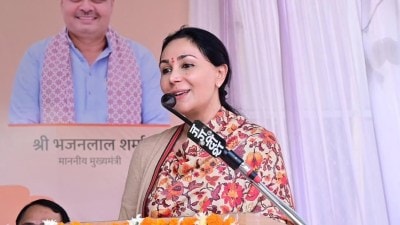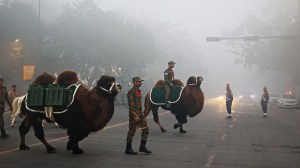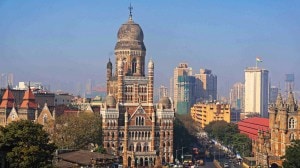Hay,hello
Kerala is the latest venue of lit tourism. Its beaches and backwaters might have lured the writers,but the states literati college students waiting with notebooks for autographs,parents walking their children to Welsh poets and youngsters thronging to listen to Vikram Seth rescued the Hay Festival from turning into a brochure event.
Kerala is the latest venue of lit tourism. Its beaches and backwaters might have lured the writers,but the states literati college students waiting with notebooks for autographs,parents walking their children to Welsh poets and youngsters thronging to listen to Vikram Seth rescued the Hay Festival from turning into a brochure event.
Malayalis dont put up a hundred picnic chairs on the green and read their paperbacks in a state of collective insouciance. They havent waited in the rains for Bill Clinton to speak or watched Mario Vargas Llosa step out of a helicopter. They dont laugh at circus tricks in one tent and listen to poetry in the next. The kind of intellectual bohemianism that belongs,for 10 days every year,to a little Welsh border village called Hay-on-Wye is unfamiliar to Thiruvananthapuram. When the Hay Festival came to the capital city of Kerala,to the red-bricked Kanakakunnu Palace,with its golden curlicues and swinging chandeliers,there were some rules to begin with: no nails on the walls,sir; and no sellotape,please; and make sure you dont move around the stately red chairs too much.
The event could have turned into a cry of Hay,oh why? But,then,there was Vikram Seth. As the author of The Golden Gate and A Suitable Boy headlined the event that was on from November 12 to 14,the crowd swelled and Anne Kristenne Moreira,head of the English department in the citys Mar Ivanios College,beamed,He is here in good old Thiruvananthapuram! Who would have thought?
Seth is writing A Suitable Girl,the sequel to his 1993 novel A Suitable Boy. Lata is in her eighties now,looking for a bride for her grandson. Lata in A Suitable Boy was based on Seths mother Leila. Then could her grandson be the son Seth could have had? Possibly, said Seth. And will he be there too? I will be there in a Hitchcockian cameo,I will be there as an anagram.
Why did he decide to revisit his old heroine? I wanted to write about contemporary India and I thought it would be interesting to know how an 80-year-old woman saw it,whether it had embittered her or enlivened her. But I still dont know how she is doing. Im hoping she would come and tell me. I dont even know if her husband Haresh is dead or alive. The book will come out in 2013,but before that there will be a collection of libretti in 2011. He is also gathering poems that he had left with friends and family for an anthology in 2012. I had never stopped writing poems, Seth said,I had just stopped publishing them.
It was not just Seth who Malayalis applauded. They listened to their own writer K Satchidanandan and young Filipino author Miguel Syjuco,British historian Simon Schama and pop mathematician Marcus du Sautoy. They even asked their parliamentarian Shashi Tharoor for autographs. And when Gillian Clarke recited a poem about a polar bear rug,a college girl who hadnt heard of the Welsh poet until that day turned to her friend,That was good. In typical festival naivete,some even went up to strangers and asked,Are you an author too? The strangers shrugged their shoulders in denial and rolled their eyes in disbelief. But that question and the seemingly indiscriminate appreciation contained in it Malayalis incurable curiosity for new writers and their desperate need for literary heroes.
If the Jaipur Literature Festival is mostly a weekend jaunt for Delhiites to catch up with each other in a suddenly erudite environment,the Hay Festival in Thiruvananthapuram was all about the local people college students waiting with splayed notebooks for autographs and parents walking their children up to Welsh poets.
Writer Jaishree Misra got it splendidly wrong when she called literature festivals the new toddy shops. If Thakazhi Ammavan the writer of Chemmeen was her granduncle and Vaikom Mohammad Basheer sat in a toddy shop and shared a few glasses of kallu,now writers meet at festivals like these, she said. She was wrong not because this was a dry venue,but because this was not about writers back-slapping and bottle-clanging. Misra,who confessed that she was just learning to read film hoardings and bus boards in Malayalam,did not know this was a different kind of cultural atavism at play.
Malayalis are not literary chauvinists but they are quite the show-offs. Until two decades ago,they flaunted not brands maybe because there werent too many of them nor was there too much money floating around for extravagant purchases,but books maybe because there were enough of them,and came rather cheap. They read their Kafkas and Tolstoys,often in translation,and gathered for annual literary sammelans in droves. A state that revelled in OV Vijayans Khazakkinte Ithihasam 1969 got Gabriel Garcia Marquezs Macondo One Hundred Years of Solitude was translated into English a year later,so much so that it is joked that Marquez is the most famous Malayalam writer.
At the Hay,held in the heart of the city unlike the Kovalam Literary Festival which hasnt been able to shed the insularity it brought upon itself by hosting minor literary celebrities in a five-star hotel on a faraway beach,Malayalis found a venue to indulge in that old curiosity,in a mild form of biblio braggadocio.
After the passing away of Thakazhi,Basheer,Vijayan and Kamala Das,Kerala has been starved of literary heroes,those who turned Malayalis into clearly divided,easily excitable groupies. As D Babu Paul,writer and retired IAS officer,says,There are Malayalam writers who stand very tall but I am not sure they create the kind of excitement authors did when I was young and they were young. There are no great literary icons for the youngsters of Kerala.
The Hay Festivals organisers might not have realised this. They might have found in the beaches and backwaters of the state the perfect setting for their lit extravaganza,just like they did in Cartagena in the Caribbean and Zacatecas in Mexico,in Belfast and in Beirut. Just mention Kerala and half the battle is won,said an organiser about how eager authors are to make a trip to the state. Clarke said the place itself was a cultural feast: It is not just the festival,but everything around it the beautiful houses,the graceful people,the trees,even the kites in the sky. This place has a character. Lyndy Cooke,executive director of the Hay Festival,said,Kerala is a destination.
Somehow,on that little green hillock in Thiruvananthapuram the touristy concerns met the lit fervour of the average Joemon.
The festival organisers say Hay will be back on the second week of November 2011. Minister for Education and Culture MA Baby says Nobel laureate Llosa is likely to attend the next edition and that authors will interact with students in schools and colleges. Cooke says they plan to turn the festival into a space for the family as well,with a section for children.
Yes,Hay Kerala would need a crowd-puller like Seth or Llosa. No,it wouldnt want a repetition of writers across successive segments: Satchidanandan talking about Malabar Mind,followed by Satchidanandan discussing poetry with ONV Kurup,followed by Satchidanandan reciting his own poems. And,yes,they would need more informed anchors than those who would laugh and say,But there is a solution to Kashmir in sight!
The city,with its government buildings,babus and quiet,rain-soaked evenings,got to know Sting,Bob Geldof and nightlife. Sting,who was in Jodhpur to attend the wedding of Shivraj Singh,son of the former maharaja Gaj Singh II,got a call from old friend Bob. He took the next flight out and jammed with Geldof on Everybodys got a hole to fill. Thiruvananthapurams self-imposed provincialism could very well do with such nights. In return,it got Seth cradling the primer Priya Malayalam and learning its slippery zh.
- 01
- 02
- 03
- 04
- 05































